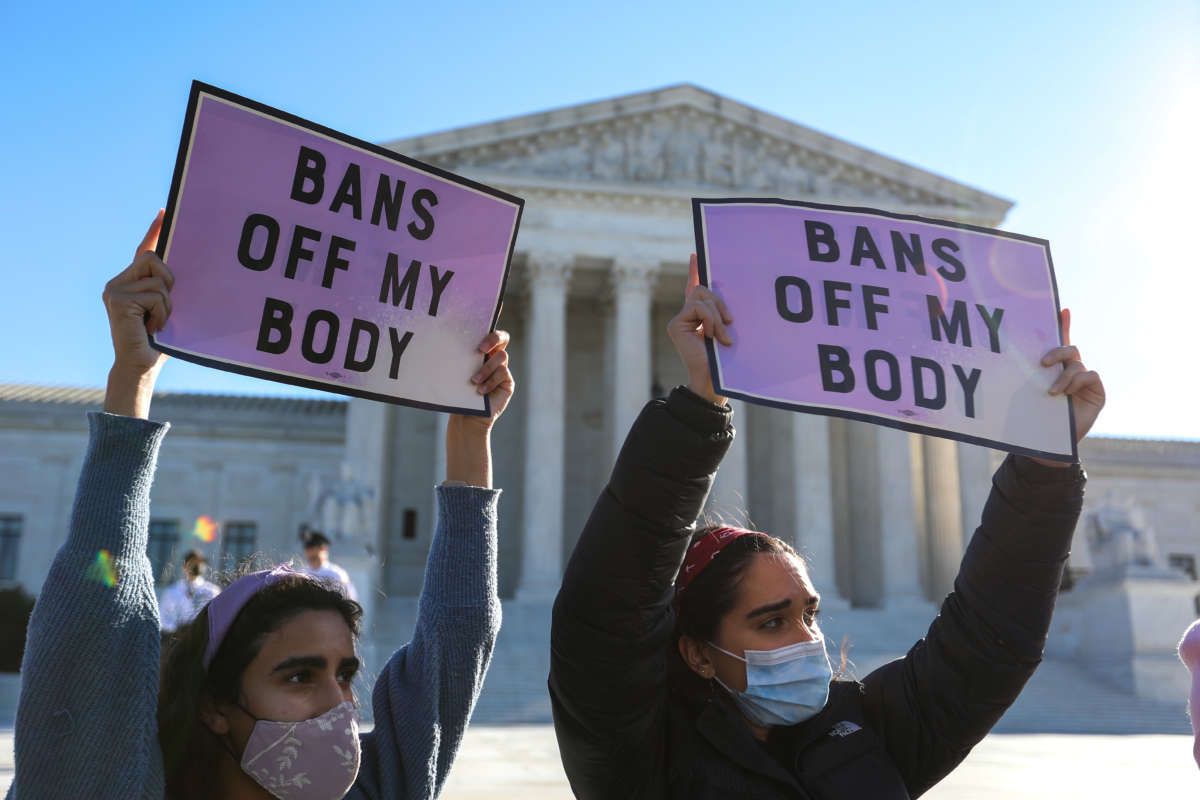Support justice-driven, accurate and transparent news — make a quick donation to Truthout today!
As conservative states across the country continue to pass restrictive abortion laws, other states are introducing and passing legislation to enshrine abortion care as a statewide right. The moves are in anticipation of the Supreme Court’s ruling on Mississippi’s Dobbs v. Jackson Women’s Health Organization, which calls into question the authority of Roe v. Wade. The landmark SCOTUS decision says abortion is a constitutional right, but if the Dobbs SCOTUS decision in June overrules or curttails Roe v. Wade, abortion rights will be left to state lawmakers. Many states like Florida and Idaho are already enacting “trigger laws” that render abortions illegal past 15 and six weeks, respectively. In response to the possibility of losing constitutional protections, other states like Colorado, New Jersey, and Vermont have introduced or passed statewide protections. The latest is Colorado’s Reproductive Health Equity Act (RHEA), which passed the majority-Democrat state House on March 10.
Reproductive justice group Colorado Organization for Latina Opportunity and Reproductive Rights (COLOR) is leading the cause to pass RHEA, which was introduced on March 3. Currently, the state does not explicitly protect abortion access and has relied on the constitutional protection of Roe v. Wade. RHEA will protect abortion access within Colorado law. According to Dusti Gurule, president and CEO of COLOR, proactive legislation to secure and expand abortion access in the state is critical. Since 2010, 44 attempts to ban or restrict abortions were voted down in the Statehouse.
“It’s about dignity, humanity, freedom, and access,” Gurule said. “We think the timing is important for Colorado lawmakers now to enact the Reproductive Health Equity Act because we know that our work is not done, and this is the floor, this is not the ceiling. We will continue to broaden our coalitions so we can ensure that the right to abortion is not continually attacked as it is every year.”
In the months since Texas Bill Senate Bill 8 passed in September 2021, rendering abortions after approximately six weeks illegal, Colorado abortion clinics statewide experienced a 130% increase in patients coming from Texas to access care, with one clinic seeing a 520% increase. If RHEA passes, it will guarantee Colorado as an option for Texans to have access to abortion care.
“By seeing those numbers increase of people who are able to travel here, there’s probably two or three that need the care that aren’t able to travel,” Gurule said. “That’s why we really want to set the tone for our region to move these issues forward.”
Currently, 15 states and the District of Columbia have laws that protect the right to abortion. Comparatively, 21 states have laws that could be used to restrict the legal status of abortion. Three states (New Jersey, Oregon, and Vermont) and the District of Columbia have codified the right to abortion throughout pregnancy without state interference, and 12 explicitly permit abortion prior to viability or when necessary to protect the life or health of the pregnant person.
In January, New Jersey Gov. Phil Murphy signed the Freedom of Reproductive Choice Act, which guarantees the right to abortion in the state.
“Today, New Jerseyans who can become pregnant will no longer question our right to make fundamental decisions about our health, our lives, and our futures,” said Roxanne Sutocky, the director of community engagement for the Cherry Hill Women’s Center, in a statement. “We appreciate the efforts of the legislature and the governor to pass this historic legislation, and we call on these representatives to do more to eliminate the remaining barriers which fall hardest on people working to make ends meet, people living in rural areas, undocumented people, and LGBTQIA+ and BIPOC communities disproportionately impacted by systemic racism and reproductive oppression.”
In February, the Vermont House of Representatives approved the “Reproductive Liberty Amendment,” an amendment that would enshrine what legislators refer to as “reproductive autonomy” in the state constitution. The amendment will ensure that the state cannot restrict abortion rights in the future, and since it refers to “reproductive autonomy,” it will also protect rights to birth control access. Voters will decide the proposal in November, where it is likely to pass. According to polls by Pew Research Center, 70% of Vermont adults believe abortion should be legal in all or most cases.
Additionally, California lawmakers are creating a series of bills that would make it a sanctuary state for abortions. Gov. Gavin Newsom convened The California Future of Abortion Council in September to identify barriers to abortion access and recommend policy solutions, such as helping cover the cost of the procedure, as well as transportation, lodging, child care, food, and lost wages for those seeking an abortion there.
Prism is an independent and nonprofit newsroom led by journalists of color. We report from the ground up and at the intersections of injustice.
Press freedom is under attack
As Trump cracks down on political speech, independent media is increasingly necessary.
Truthout produces reporting you won’t see in the mainstream: journalism from the frontlines of global conflict, interviews with grassroots movement leaders, high-quality legal analysis and more.
Our work is possible thanks to reader support. Help Truthout catalyze change and social justice — make a tax-deductible monthly or one-time donation today.
